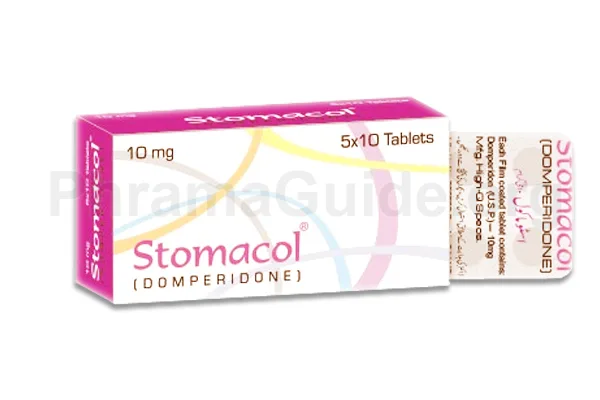Stomacol is a medication primarily used to treat conditions like nausea, vomiting, bloating, and feelings of fullness. Stomacol can have various side effects, some of which are more common than others. It’s important to note that not everyone experiences these side effects, and their severity can vary from person to person health conditions. Here are some common and less common side effects of Stomacol include.
Common Side Effects
- Dry mouth: You might feel a sensation of dryness in your mouth due to reduced saliva production.
- Headache: Some individuals experience mild to moderate headaches while taking Stomacol.
- Dizziness: Feeling lightheaded or dizzy can occur, especially when standing up quickly.
- Abdominal cramps: Some people may experience mild discomfort or cramps in the abdominal area.
- Diarrhea: Changes in bowel movements, including diarrhea, can occur in some cases.
- Fatigue: Feeling tired or experiencing a lack of energy might be a side effect.
- Increased heart rate: Occasionally, individuals may notice their heart rate increasing slightly.
- Rash or itching: Allergic reactions to Stomacol may manifest as skin rashes or itching.
- Changes in menstrual periods: Some women might experience irregularities in their menstrual cycles.
- Breast tenderness or production of breast milk: In some cases, Stomacol can cause breast-related issues like tenderness or milk production in both men and women.
Less Common Side Effects
- Irregular heartbeat: Some individuals might experience irregularities in their heart rhythm while taking Stomacol. This could manifest as palpitations or unusual awareness of their heartbeat.
- Muscle cramps: In rarer cases, muscle cramps or spasms can occur as a side effect of this medication.
- Difficulty urinating: Some people may experience difficulty in passing urine or changes in urination patterns.
- Swelling of the breasts in men: Gynecomastia, or swelling of breast tissue in males, is an uncommon but reported side effect.
- Galactorrhea: Unintended production of breast milk in men and non-lactating women might occur in rare instances.
- Nervousness or agitation: Occasionally, individuals might experience heightened feelings of nervousness or agitation while taking Stomacol.
- Visual disturbances: Some people might report visual disturbances such as blurred vision or difficulty focusing.
- Allergic reactions: While less common, severe allergic reactions like rash, itching, swelling of the face, tongue, or throat, and difficulty breathing can occur.
- Liver problems: In very rare cases, Stomacol can cause liver issues. Symptoms might include yellowing of the skin or eyes (jaundice), dark urine, or persistent nausea.

What is Stomacol?
Stomacol is one of the leading brands of Domperidone, manufactured and marketed by High-Q Pharmaceuticals (Pvt) Ltd, Pakistan.
Stomacol : Available Formulations and Strengths
Presently, Stomacol is available in Tablet Form with the following strength.
Stomacol Tablet : 10mg strength.
What Are The Possible Drug Interactions of Stomacol?
- Antifungal medications (e.g., ketoconazole, fluconazole): These drugs can inhibit the enzyme responsible for metabolizing Stomacol, potentially increasing its concentration in the blood and the risk of side effects.
- Antibiotics (e.g., erythromycin): Similar to antifungals, erythromycin, and other macrolide antibiotics can increase Stomacol levels in the blood, potentially leading to increased side effects.
- Antiretroviral medications (e.g., ritonavir): Some antiretroviral drugs used to treat HIV/AIDS can inhibit the metabolism of Stomacol, leading to increased levels in the blood and potentially causing adverse effects.
- Antidepressants and antipsychotics: Certain medications used to treat depression or psychiatric conditions, such as selective serotonin reuptake inhibitors (SSRIs) and certain antipsychotics, may increase the risk of irregular heart rhythms when combined with Stomacol.
- Antiarrhythmic drugs (e.g., amiodarone): Combining Stomacol with certain antiarrhythmic medications can increase the risk of irregular heart rhythms or QT prolongation.
- Gastrointestinal medications: Some medications used to treat stomach ulcers or reflux, such as proton pump inhibitors (PPIs) or H2 blockers (e.g., ranitidine), may interact with Stomacol by affecting its absorption or metabolism.
- Grapefruit juice: Consumption of grapefruit juice can inhibit the enzyme responsible for breaking down Stomacol, potentially increasing its concentration in the blood and the risk of side effects.

Leave A Comment